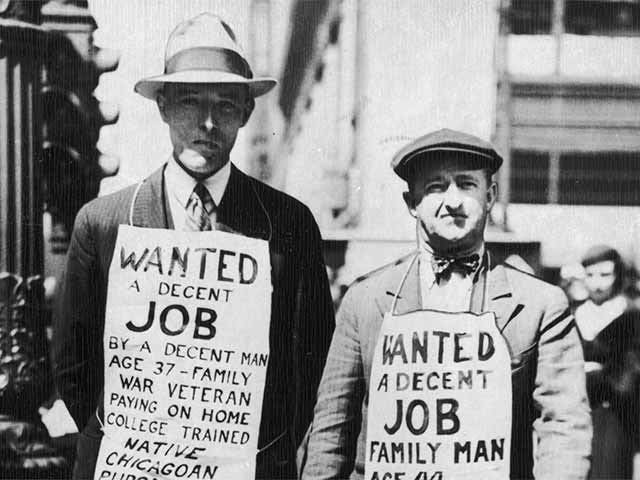
Where Was Their White Privilege?
Capitalism did not cause the Great Depression. The Great Depression was something that the government did to capitalism. (The great Recession, too.)
We had the Federal Reserve and monetary experts running the system under the belief that we need to maintain a stable value of money. This was achieved by keeping consumer product prices stable. In order to do that in the 1920’s, at a time when productivity of labor was increasing and the supply of all goods was rising and the cost of production falling, you needed a growing supply of money. The Fed provided this, thus overriding capitalism’s natural tendency toward a falling Consumer Price Index. The supply of new money needed to keep CPI stable went to inflating stock market prices. When Benjamin Strong “…gave a little coup de whiskey to the stock market”, that inflated asset bubbles even more.
The proto-Keynesian demand side assumption was that lower prices are bad, and you need to prop up consumer prices to keep industries healthy. But when, in a capitalist economy, businessmen make investments in machinery and new production techniques, productivity increases, cost of production falls, and so, consistent with the laws of supply and demand, consumer prices fall.
The growing stock market bubble, induced by all the new government credit, then collapsed in 1929. President Herbert hoover, never an advocate of laissez-faire, then intervened heavily. He called industry leaders to Washington to pressure them not to lower workers’ wages, implemented public works projects, promoted cartels, increased government spending, ran deficits, and imposed all sorts of new regulations and government programs to “help” the economy recover.
It was those Washington meetings with industry leaders that Lee Ohanian of UCLA blames for as much as 2/3 of the unemployment during the Great Depression.
http://www.nber.org/papers/w15258
“Herbert Hoover. I develop a theory of labor market failure for the Depression based on Hoover’s industrial labor program that provided industry with protection from unions in return for keeping nominal wages fixed. I find that the theory accounts for much of the depth of the Depression and for the asymmetry of the depression across sectors. The theory also can reconcile why deflation/low nominal spending apparently had such large real effects during the 1930s, but not during other periods of significant deflation.”
Then additional government programs and regulations under President Roosevelt added to the government’s oppression of the economy. When I read descriptions of FDR’s “recovery” programs, it calls to mind the quote, attributed to Captain Bligh, “The beatings will continue until morale improves.”
Capitalism per se, is just the exchange of goods and services based on market forces, real, imagined, add the government then it artificially manipulated and that is were the problem occur.
So the answer is a simple No, capitalism did not cause the Great Depression. To the contrary, the Depression was caused by absence of, or interference with, capitalism. Capitalism is the free exchange of goods, services, and ideas in the marketplace. The market sets the prices, and consumer choice creates the equilibrium between supply and demand.
However the federal government began interfering with free markets, imposing inflationary and expansionist policies (with governments in other countries following a similar path). As a result of those government-imposed policies, the markets responded, and that response was a radical downturn preceding the Depression. The government responded to the downturn with even more inflationary and expansionist policies, and even more intrusion in the marketplace, and the response was even more downturn, into the Great Depression.
Thus, the one thing that could have prevented or cured the Great Depression was capitalism, and it is the one thing that was not allowed. The most important point of the Great Depression is that as long as the government continues to exercise political control over the economy, the economy will continue to boom and bust, with the predictable winners and losers.
Under socialism there are shortages and problems all of the time. With capitalism there are “ups and downs.”









